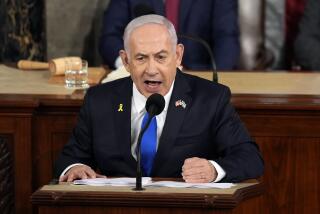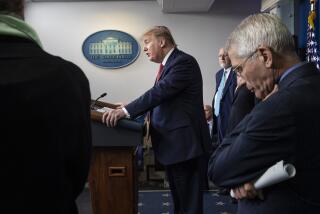Administration Takes Friendly Fire at Hearing
WASHINGTON — Stifling private concerns about the direction of events in Iraq, Senate Republicans on Tuesday gave the Bush administration a largely supportive platform for restating its case for war as Congress began three days of hearings on the planned June 30 transfer of sovereignty.
And Deputy Defense Secretary Paul D. Wolfowitz, appearing before the Senate Armed Services Committee, used the friendly forum to focus on the atrocities committed by Saddam Hussein before the U.S. invasion, not on the challenges ahead or at hand.
He offered only sparse details on the question of what sort of government the administration thought would emerge in Iraq, or what relationship the U.S. military would have with the Iraqi government after the transition.
“I cannot sit here today and predict the exact form of the permanent government,” Wolfowitz said, “but even an imperfect Iraqi democracy will be an improvement light years beyond what that country has endured for the past 35 years.”
The interim Iraqi government “will be selected by procedures being developed through intensive consultations among Iraqis, led by Ambassador [Lakhdar] Brahimi, the U.N. secretary general’s special advisor on Iraq,” Wolfowitz said. He described Brahimi’s ideas for forming an interim government as promising, adding, “We look forward to more details from the U.N.”
Wolfowitz’s appearance came at a critical moment. With Congress returning from recess, this was the administration’s first public testimony on Capitol Hill since surging violence in Iraq raised the specter of a full-scale revolt against the U.S.-led occupation.
Yet Republicans on the Armed Services Committee closed ranks to support the administration’s policies, even though some acknowledged outside the hearing room that pressure from constituents was growing. The Republicans were joined by many of the panel’s Democrats -- suggesting that most members of the Senate thus far see few political benefits to be gained from challenging the administration’s conduct of the war.
Indeed, a senior Republican strategist said he viewed this week’s Iraq hearings not as an occasion to grill administration officials or pose skeptical questions but as “an opportunity for the administration to come up here and lay out their case and talk about why they are doing the right things.”
Wolfowitz’s testimony drew a sharp response from Sen. Edward M. Kennedy (D-Mass.), one of the administration’s harshest critics on Iraq. “Your presentation is somewhat disingenuous,” Kennedy snapped at Wolfowitz. “Everyone knows Saddam Hussein was a brute, was despicable,” Kennedy said, adding, “there wasn’t a word in this presentation about weapons of mass destruction.”
Separately, the veteran chairman of the Senate Foreign Relations Committee, Indiana Republican Richard G. Lugar, reiterated his concern with the direction of U.S. policy in Iraq.
But such moments were rare.
During the 3 1/2-hour Armed Services hearing, senators of both parties emphasized that their concerns revolved around what was needed to ensure success in Iraq, not on whether the United States should be reconsidering its commitment.
Some pressed Wolfowitz and Gen. Richard B. Myers, chairman of the Joint Chiefs of Staff, to say when the administration would request supplemental funding for Iraq from Congress, and how much it would seek. Myers said the Pentagon was “evaluating right now” whether it would need more money for Iraq before next year.
The administration had previously said it would not send a new request for money to Congress before the elections.
“We thought before, with what the services were identifying as shortfalls, that we could bridge the gap for the last month of this fiscal year,” which ends in October, “and cover our expenses,” Myers said. “I think we just have to ensure ourselves that’s still true given the higher expenses we have now.”
Republicans said the soft-spoken Wolfowitz, widely regarded as the intellectual architect of the war, was the administration official best equipped to assuage Congress’s anxieties.
“Secretary Wolfowitz did an excellent job,” said Sen. Susan Collins (R-Maine), adding that he “brings a clarity of vision to a chaotic situation.”
“In contrast with [Defense] Secretary Rumsfeld,” she said, “who bristles when members of Congress ask him questions, Wolfowitz calmly and methodically responds to whatever he is asked.”
The hearings, Collins said, were “very useful in focusing the administration’s attention on the very real concerns about where do we go from here, now that this has not unfolded the way we would have expected.”
Wolfowitz downplayed the importance of the June 30 deadline. He and Myers said the U.S. military would remain in Iraq long past that date, and would retain responsibility for internal and external security. That led some senators to question whether it was either accurate, or politically astute, to say that Iraqis would regain sovereignty on June 30.
Armed Services Committee Chairman John W. Warner (R-Va.) also said he thought the administration was allowing expectations to rise by speaking of transferring sovereignty to the Iraqis on June 30.
Better, Warner said, to speak of restoring “limited sovereignty.” He noted a dictionary definition of sovereignty as “supreme and independent” political authority, something Iraqis will not have after the transition, with 135,000 U.S. troops on the ground and U.S. officials continuing to offer support in all Iraqi ministries..
As Wolfowitz was testifying before the Armed Services Committee, Lugar opened three days of Senate Foreign Relations Committee hearings on the upcoming transition in Iraq by complaining that the administration had declined his invitation to Wolfowitz to testify. Moreover, he said, the administration had failed to provide any senior official to explain its plans for the transition.
Lugar criticized the administration for being “unable or unwilling to provide adequate answers on Iraq.”
The administration, Lugar said, “must present a detailed plan to prove to Americans, Iraqis and our allies that we have a strategy and that we are committed to making it work.”
The hearings had been seen as posing a particular challenge for Republicans. With the election campaign underway, the rising insurgencies have made April the bloodiest for U.S. troops in Iraq than any time during the war.
The fighting has forced the Pentagon to delay troop rotations and extend tours of soldiers, reservists and National Guardsmen in Iraq, angering some family members.
Republicans responded to the challenge with a two-part strategy: registering concerns about the troops, while vigorously protecting the administration from attack by Democrats.
“I am increasingly concerned about the strain we are putting on our reservists, our Guard members,” Collins told Wolfowitz. In Maine, she said, some reservists have been deployed for years at a time and called up multiple times for long stretches in the last decade.
Lawmakers have returned from a long spring recess, which many spent in their states. Outside the hearing room, as congressional business got underway for the week, some congressmen said they had been peppered with questions from constituents feeling the pinch of Bush’s decision to extend tours of duty in Iraq for National Guard and Reserve units.
“Guard and Reserve families are stressed,” said Sen. Lindsey O. Graham (R-S.C.). “People asked, ‘How can we better devise the exit strategy?’ A lot of [senators] are getting those questions. What’s the timetable?”
Sen. Robert F. Bennet (R-Utah) said, “There’s obviously great angst over the extension of tours.”
Among those who have called for increased troop strength -- even before Bush announced last week that he would go along with that -- is Sen. Ben Nighthorse Campbell (R-Colo.).
“If we’re over there to win, we need more troops,” he said. “If we’re over there to die, we need fewer troops.”
More to Read
Get the L.A. Times Politics newsletter
Deeply reported insights into legislation, politics and policy from Sacramento, Washington and beyond. In your inbox three times per week.
You may occasionally receive promotional content from the Los Angeles Times.











